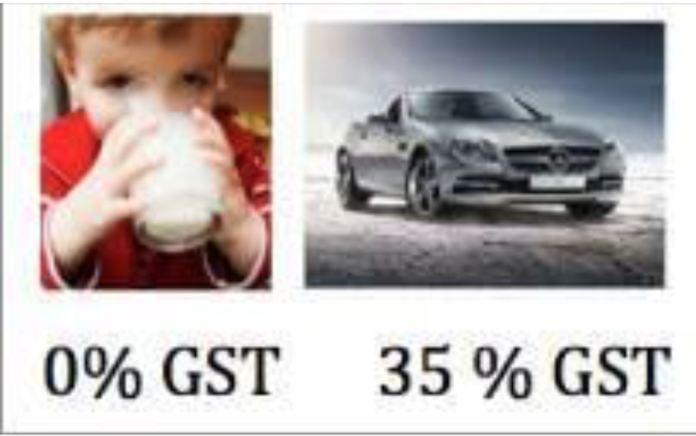Take the tax off food and have a consumption tax on luxury consumer items.
And don’t tell me a differential GST is too complicated to administer. The Australians, for example, operate a luxury car tax and a differential sales tax on food.
So it’s entirely possible.
Does it require more administration? Yes.
But then , government created jobs (eg. administrators) creates income for people who can support their families and whose spending stimulates the economy.
Bryan Bruce is one of NZs most respected documentary makers and public intellectuals who has tirelessly exposed NZs neoliberal economic settings as the main cause for social issues.






How about eliminating secondary tax for filthy underclass peasants with multiple jobs? How much did your property increase in value yesterday, btw? *crickets chirping* “Crash the housing market, or wait for society to crash and take it down, too”
Or, just give people a $250 tax free UBI each week. Simpler, quicker, more effective.
” Take the tax off food and have a consumption tax on luxury consumer items”….
———————————-
Of course!, – the neo liberal days of shafting the poor, and the working poor are over. Happy days. Its time for the neo liberal system to be taxed to oblivion. Its time for Keynesian economics to restore the wealth of the country , – to ALL sectors of society. Not just the rich. Policy’s for the many , – not the few.
And scrubbing the rich-mans playground toys by giving them whopping taxation and scrubbing GST is just part of the plan to get this country back in balance. NOW,… about these low wages… Billy and Johnny are no longer in parliament so why the dragging of feet on housing, taxation and wages, Labour?
Successive Governments don’t even look at GST as a tax. The meaning of it is lost because it’s just another source of income that they can easily get their hands on without even mentioning the word tax. I too can’t see why the GST on food can’t be dropped and more tax on luxury items Even if it does cost more to administer. But then the Government would then have to increase taxes in other areas and a LOT more on luxury items. Mmmm not popular at the moment and this is a populist Government.
It used to be that computers were touted as assisting society and making everything easier and faster. Administering a two tier GST tax doesn’t have to be hard, you just change the programs. Off all food means that restaurant meals can go down and people can afford to eat out and so support the hospitality industry.
Virtuous circle.
Taxes don’t need to go up as much as everyone thinks. 15% is a high enough GST on everything else. If motor cars are to be taxed heavier, let there be a graduated one building on 15% with size being one of the factors getting copped. Why do all these mini buses and hum-v type of motors get encouraged they tower above and spread across roads, parking spaces. When new ones are bought the rate goes up with height and length, and the licence fees are higher too.
It is how the taxes are distributed that makes a difference. 5% should go back to the area where collected to the Council there to assist with infrastructure needed by the people, not a stadium etc.
When I came to NZ (1974) milk was 4 cents a litre (4 cents refundable deposit on the bottle) and other basic items were similarly priced.
On the other hand, luxury goods were heavily taxed, and if you wanted to buy a car [from memory] you had to pay 60% at the time of purchase and the remainder over 18 months. People took great care of their possessions, and vintage cars were commonly seen on the roads. Getting from A to B was generally not impacted by congestion. And you could park close to the beach at Mission Bay or Brown’s Bay for free.
There was no such thing as junk food in the form of McDonald’s, KFC etc. in NZ, and snapper and lamb and beef were generally affordable.
Unemployment was officially zero, but in practice was around 0.5%. All kinds of trades and professions provided opportunities for employment -from making shoes to shoes, to furniture to electronic goods to clothing in the diverse economy.
If you needed urgent medical attention you could go to the nearest hospital and, after a short wait, be seen by a doctor who was not stressed out from overwork.
The globalists and growth-merchants, what Martyn describes as death-cult capitalists, sure have fucked it all up. Now you can buy a pair of foreign-made shoes that have flashing lights incorporated but can’t afford a healthy diet.
Okay, it wasn’t all a rose garden in the 1970s: IWD was making nasty stuff in New Plymouth and allowing dioxin to escape into the air when they weren’t dumping ‘inconvenient by-products’ into land fill or off a convenient cliff where no one would notice too much. Smoking was endemic, causing non-smokers to suffer the effects of passive smoking in most confined public spaces.. Cow shit was getting into rivers. But the number of cows was only about a quarter of the current number.
As for taxes. well they should never have been imposed on the basics of life -food, water, basic clothing, and even higher taxes should have been imposed on unnecessary luxuries.
But the globalists were really interested in two things: expanding the banking sector and its hold on society, and increasing consumption. An increasing population served both as aspects.
So now we are seeing the dire consequences of both of those agendas, with waste no one knows what to do with coming out our ears, and a globalised banking system that is well down the path to implosion.
First McDonalds opened in Auckland in 1976
That was too boring for the wealthy barons. Turning to exports for increase in GDP meant that homegrown was passe’. We can get it for you wholesale from overseas sell it cheaper than you can make it, and make a whacking profit in the process. People going out of work. Nonsense, there will be hundreds of jobs in the new economy.
With this type of thinking it won’t take long for bread to become a luxury item.
Bryan, I think this is a very good idea…and I buy a fair amount of, well, not just basic food let’s just say. I don’t mind extra GST on those kind of purchases, if it helps allround.
^
Coupla’ dreamboats who’ve never learned NZ’s recent political and economic history…and here they comment as if an authority…
those administration costs are another cost on the business so will need to be past on so the saves will not be that great. Then you have the problem of what is and is not luxury items. As it is at the moment an electric car is a luxury. With fresh fruit and veg how would you know if it had the GST of as at the moment I can pay up to a $ 1 difference for a kilo of bananas at different shops.
Very easy to administer. Remove GST from food classified as anything “fit for human consumption and is digestible”. Don’t distinguish between food for two reason a) the govt has no right to preference what you eat, b) it makes it easier to enforce and therefore easier for the public/business to accept. If they believe it’s good to have a sugar tax, then that can be added separately as a form of excise tax, if required. We don’t want a complicated VAT system as they have in the UK.
What about drinks (and are soups/milk/orange juice a drink or a food)? GST on wine yes/no? If yes, then why not Coke or cream since both are “luxury” items at the end of the day. GST on caviar and foie gras and Wagyu beef yes/no? Should McDonalds have GST on it yes/no? These questions are not super easy to answer.
Here is some of what is GST-Free in NZ now: Example GST Exempt Supplies in NZ
Here it is from the Govt, in more detail: IRD Govt NZ GST Zero Rated
It is clear who is advantaged by this, which wealth-layer of our society benefits at present, from GST exemptions. And, it makes a lie of the argument that “Having some things exempt would be too complicated”.
GST-Free Foods in Aus: <a href="Aus Tax Office, GST and Food
Some aspects of this seem to be under review by their parliament Aus Parliament House, Proposed GST
“The Government’s proposed GST provides for the zero-rating of food for human consumption in a number of cases, and for input-taxing (or “exempting”) food for human consumption in a number of other cases.” Details on the page.
It includes this:
Some of the policy implications of these outcomes might include:
it is extremely difficult to design a compensation package which allows food to be taxed but still maintains equity;
and it would be possible to exempt food and to make up for the loss of revenue with a modest scaling back of tax cuts and by applying other compensatory measures.
Reason and international comparisons show that there is little credibility to the claim that exempting food would create insurmountable definitional and administrative problems.
Just to be clear, these are the G.S.T-Exempt foods in Aus now, (and note their GST is 10%, not the 15% dished out to us by the Key govt) .
C&Paste from the ATO link above, “The following foods are GST-free”:
bread and bread rolls without a sweet coating (such as icing) or filling – a glaze is not considered a sweet coating
cooking ingredients, such as flour, sugar, pre-mixes and cake mixes
fats and oils for cooking
unflavoured milk, cream, cheese and eggs
spices, sauces and condiments
bottled drinking water
fruit or vegetable juice (of at least 90% by volume of juice of fruit or vegetables)
tea and coffee (unless ready-to-drink)
baby food and infant formula (for children under 12 months of age)
all meats for human consumption (except prepared meals or savoury snacks)
fruit, vegetables, fish and soup (fresh, frozen, dried, canned or packaged)
spreads for bread (such as honey, jam and peanut butter)
breakfast cereals.
The UK VAT system overall seems very complicated. We don’t need that.
However it looks as though just about all foods are “Zero Rated” for the VAT. There is a list of zero rated products here: Value Added Tax in UK, Wiki
GST in Canada is 5%. Some items are exempt or are zero rated.
“Common zero-rated items include basic groceries, prescription drugs, inward/outbound transportation and medical devices (GST/HST Memoranda Series ME-04-02-9801-E 4.2 Medical and Assistive Devices). Certain exports of goods and services are also zero-rated. Print books and print scholarly journals are untaxed; however, ebooks and online periodicals are taxed as well as any periodicals with a significant amount of advertising.” From Wiki Wiki GST Canada
Meanwhile, this has to be part of the picture:
Stuff 10th August 2020, Auckland City Mission sees massive rise in demand for food parcels
RNZ 20th August 2020, Thousands Turning to Food Banks
Herald 24th August 2020, Huge Demand for Food Parcels and Food Grants
NewsHub 23rd August 2020, Sikh Community Steps in again as hundreds of families queue for food
Stuff 16th August 2020, Auckland Marae Support
“Manurewa Marae chief executive Tarsh Kemp said the biggest need in the community is for food and hygiene packs, and the marae has gone from handing out 100 food parcels in a week to 100 a day.”
Yes! (Although milk isn’t good for humans, the general idea applies)
Comments are closed.